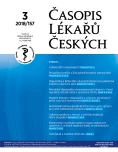-
Medical journals
- Career
Queue management systems are not a necessary measure for the protection of personal data
Authors: Jiří Navrátil 1,2; Jan Payne 3; Pavel Calda 4
Authors‘ workplace: Advokátní kancelář Brno-Ivanovice 1; rozkladová komise Úřadu pro ochranu osobních údajů 2; Ústav humanitních studií v lékařství 1. LF UK, Praha 3; Gynekologicko-porodnická klinika 1. LF UK a VFN v Praze 4
Published in: Čas. Lék. čes. 2018; 157: 152-154
Category: News
Overview
The new legislation, in particular the General Regulation on Personal Data Protection (GDPR), constitutes relatively demanding criteria on healthcare. However, the institute of medical secrets, which is an ancient medical practice and is part of various legal and professional regulations, contains many elements of today's protection of personal data and is not new among the professional medical public. Under the GDPR, however, there are steps that can be labelled as at least controversial. Such disputable measures have recently been to introduce electronic queue management systems, as we know from post offices. They are not a necessary measure for the protection of personal data in the waiting rooms of ambulances, they are not required by law, even with regard to GDPR and from the point of view of medical ethics are even at least problematic. If GDPR is applied in a similar way, it does not really benefit from the protection of personal data, and a useful tool like GDPR will be undoubtedly discredited.
Keywords:
electronic queue management systems, GDPR, medical ethics, personal data protection, patient
Sources
1. Navrátil J a kol. GDPR pro praxi. Vydavatelství a nakladatelství Aleš Čeněk, Plzeň, 2018.
Labels
Addictology Allergology and clinical immunology Angiology Audiology Clinical biochemistry Dermatology & STDs Paediatric gastroenterology Paediatric surgery Paediatric cardiology Paediatric neurology Paediatric ENT Paediatric psychiatry Paediatric rheumatology Diabetology Pharmacy Vascular surgery Pain management Dental Hygienist
Article was published inJournal of Czech Physicians

-
All articles in this issue
- Celiac disease in children and adolescents
- Diagnostika a léčba dětí s akutními křečemi na pediatrické jednotce intenzivní péče
- Modern methods in diagnostics and research of molecular bases of rare diseases
- A horizontal transmission of genetic information and its importance for development of antibiotics resistance
- Queue management systems are not a necessary measure for the protection of personal data
- Short view on origins of paediatric health care in Prague
- Periodic fevers and other autoinflammatory diseases
- Prenatal diagnostics of chromosomal aberrations in the Czech Republic: Actual data and important trends
- Lymph node syndrome associated with cat scratch disease in children and adults
- Journal of Czech Physicians
- Journal archive
- Current issue
- Online only
- About the journal
Most read in this issue- Periodic fevers and other autoinflammatory diseases
- Lymph node syndrome associated with cat scratch disease in children and adults
- Celiac disease in children and adolescents
- A horizontal transmission of genetic information and its importance for development of antibiotics resistance
Login#ADS_BOTTOM_SCRIPTS#Forgotten passwordEnter the email address that you registered with. We will send you instructions on how to set a new password.
- Career

